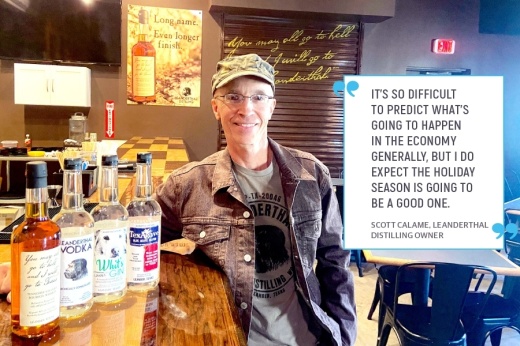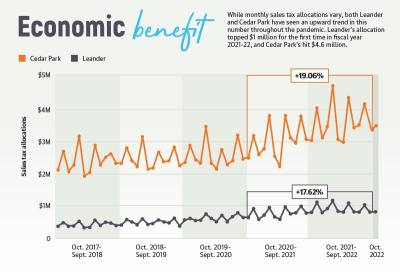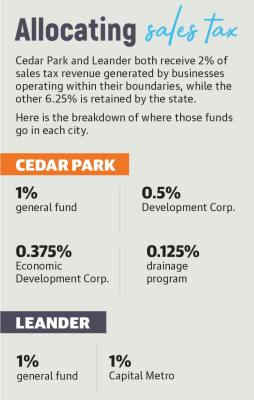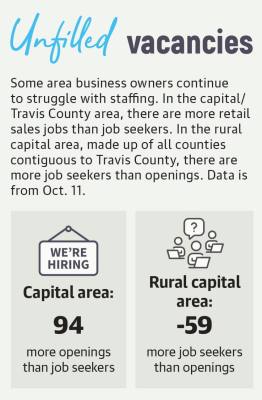Founder and CEO Scott Calame said the distillery is regulated like a bar, and for that reason, was closed for a large part of the pandemic.
Since the height of the pandemic, Leanderthal Distilling has returned to its normal production, also operating the Leanderthal Lounge, a tasting room with a menu of craft cocktails and bottle sales.
Calame said despite economic uncertainty moving forward, he hopes the holiday shopping season is fruitful for businesses like his.
“It’s so difficult to predict what’s going to happen just in the economy generally, but I do expect the holiday season is going to be a good one,” Calame said. “What happens down the road with any increased inflation we may have is really anybody’s guess.”
As the Cedar Park and Leander communities are experiencing gains in local sales tax allocations from the state, some locally owned businesses are still struggling with supply chain and staffing issues following the pandemic.
Data from the Texas Comptroller of Public Accounts shows both cities saw increases in local sales and use tax over the past four fiscal years.
In Cedar Park, sales tax allocations increased 19.06% in fiscal year 2021-22 compared to FY 2020-21. During the same time frame, allocations in Leander were up 17.62%.
Robert Powers, the city of Leander director of finance, said this is a continuation of the upward trend in sales tax revenues seen in the city throughout the pandemic.
“I think it was a combination of three things: just population growth, people shopping at home and then people shopping more locally than they may have done so in the past,” Powers said.
Ongoing challenges
In 2021, local businesses said struggles with staffing and supply chain issues were driven by the pandemic, as previously reported by •Community Impact•. Nearly a year later, some owners say those problems persist.
“What we’re seeing now is still some quantity and availability issues but also general inflation on all of the various inputs of production that we use,” Calame said.
Angela Huling, owner of Turquoise Peacock Boutique in Leander, said she has been dealing with some supply chain issues from her vendors.
“I don’t get to purchase from some of the [vendors] that I really liked due to the supply,” Huling said. “I can’t get what I need, or it has gone up in cost.”
Additionally, Bridget Brandt, president and CEO of the Leander Chamber of Commerce, said she hears from business owners who are affected by inflation.
"Inflation is having a big impact on all of our businesses, but particularly small business owners," Brandt said.
She said inflation causes local businesses to have a hard time hiring and retaining employees.
“With the rising cost of entry-level employees, finding employees and qualified candidates has been a big challenge,” Brandt said.
Data from the Texas Workforce Commission shows as of Oct. 11, the capital area—which includes Travis County—has 94 more job openings than job seekers. Meanwhile, in the rural capital area—which includes all the counties contiguous with Travis County—there are 59 more job seekers than openings.
Lisa Brown, who owns the Cedar Park boutique Beau Kisses, said it has been hard for her to find job applicants.
“It’s hard for us to find people we can use. ... We just don’t get applicants at all in the Cedar Park area,” Brown said.
Sales tax implications
Shopping from local businesses can help boost the local economy due to the way sales and use taxes are assigned, according to city officials.
In Texas, sales and use taxes are collected by the retail businesses and sent to the Comptroller’s Office. The state retains 6.25% of the 8.25% tax and allots the remainder back to the city.
Powers said Leander uses those funds to go back into the city’s general fund, which pays for public safety, public works, engineering, planning, development, parks and recreation, and any other regular departments the city operates. Additionally, in Leander, 1% goes to Capital Metro to pay for public transportation services.
Cedar Park’s 2% of sales is split between the general fund, a drainage fund, an economic development fund and a development fund.
Powers said the city is trying to grow its sales tax revenue.
“The more commercial development we can have, the less pressure there is on property taxes and other fees to support the operating budget,” Powers said.
Brandt said despite the challenges facing local shop owners, she expects the holiday shopping season to bring in increased revenues for both businesses and the city.
“Leander is doing really well; we are thriving, and we’re opening more and more businesses,” Brandt said.
Brown said customers have already started shopping for the holiday season, and 50% of Beau Kisses’ sales for the year come in the fourth quarter.
“We’ve already seen a lot of people out shopping early for holiday gifts, so I foresee us to have a strong holiday season in the Cedar Park area for sure,” she said.








